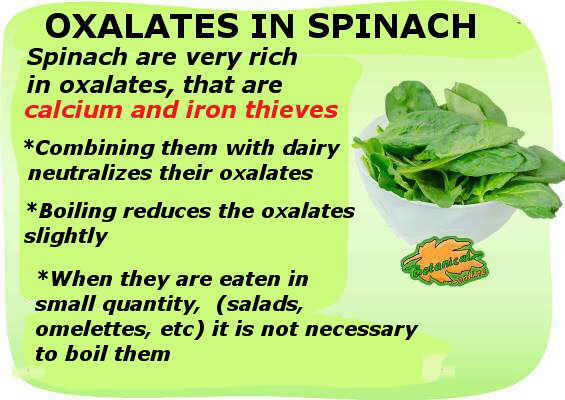Spinach is high in both calcium and oxalates so people who are at a high risk of developing kidney stones should. As a result women who have osteoporosis or are more prone to developing it are often advised to stop eating spinach.
 Oxalates In Spinach Botanical Online
Oxalates In Spinach Botanical Online
Spinach is an excellent source of calcium containing 2448 mg per cup.

Does spinach have calcium. Calcium in Spinach A cup of raw spinach has 297 milligrams of calcium or 3 percent of the daily value. Spinach is high in oxalates so even though it has quite a bit of calcium your body may be unable to absorb some of it. Kale ranks in with 139 mg of calcium and the spicy mustard greens have 103 mg of calcium per 100 g serving.
Spinach is very healthy. A cup of raw spinach leaves contains 297mg of calcium. But a cup of.
1 cup of raw spinach 29 milligrams of calcium 20 calories 12 cup cooked spinach 122 milligrams of calcium 45 calories This amount of cooked spinach has more calcium because it actually represents three to four cups of raw spinach. One cup accounts for 245 of your daily value intake. Spinach has a high calcium content.
By way of comparison the body. As a result only about 5 of the calcium or approximately 11 mg is actually absorbed. The most common variety is calcium stones which consist of calcium oxalate.
Amount of Calcium in Spinach. Unfortunately spinach may also interfere with calcium absorption. Spinach does not deplete other dietary sources of calcium such as yogurt cheese and milk 1.
Spinach also has a moderate calcium content which can be affected by oxalates decreasing its absorption. It contains Vitamin A calcium Vitamin C iron and very few calories. Raw spinach has low calcium bioavailability due to high amounts of oxalic acid which binds with the calcium found in spinach thus reducing its digestibility.
Green vegetables such as spinach beet greens and Swiss chard are high in calcium but their high levels of a compound called oxalic acid binds calcium and reduce its absorption. Spinach and Calcium. The calcium in spinach is among the least bioavailable of food calcium sources.
By way of comparison the human body can absorb about half of the calcium present in broccoli yet only around 5 of the calcium in spinach. However thanks to its mellow flavour spinach can be included in all kinds of recipes and large amounts of it can be eaten meaning you can still get a fair amount of calcium from it. So although it has a lot of calcium its less available than the calcium in low-oxalate greens such as kale and collard greens.
The basic type of spinach is Spinach raw where the amount of calcium in 100g is 99 mg. But studies have found that if you eat the recommended daily amount of calcium this effect isnt seen. 99 mg of calcium per 100g from Spinach raw corresponds to 10 of the calcium RDA.
One cup of steamed bok choy has around 158 mg of the mineral. The high oxalate content in spinach for example can inhibit calcium absorption. However spinach also contains oxalates which prevent bones from absorbing calcium.
However spinach also contains oxalic acid a compound that binds to calcium and interferes with your ability to absorb it. Spinach contains many valuable vitamins and minerals such as potassium magnesium vitamin K and calcium. Spinach is one of them.
The take-home is that the calcium to oxalate ratio is more important than the high levels of oxalate. Although rich in calcium spinach also contains a high amount of oxalic acid which forms an indigestible complex with calcium thereby reducing the bioavailability of calcium from spinach. Besides how much calcium is absorbed from spinach.
But unlike kale spinach contains a high amount of oxalate. The oxalate content in spinach binds with calcium decreasing its absorption. Welcome to the nutritional calcium content in 10 different types of spinach ranging from 165 mg to 83 mg per 100g.
A 100g serving of collards packs a 145 mg-calcium punch. A cup of whole milk contains 2757mg 2 fat milk 2855 and fat free 3161mg. However the calcium isnt absorbed as well as the calcium in dairy products says Gidus.
Spinach is high in calcium with 56 mg of calcium per cup.
